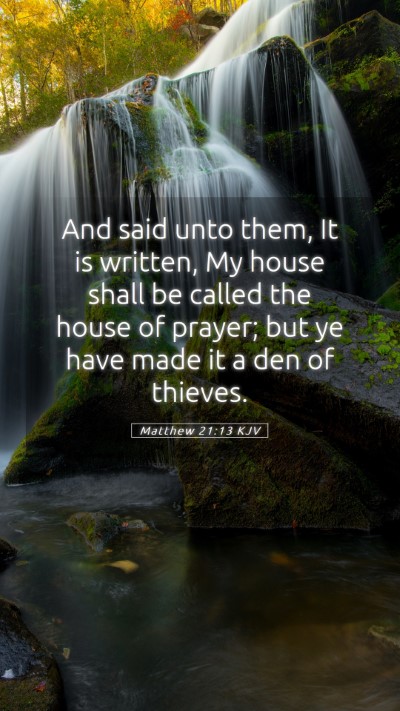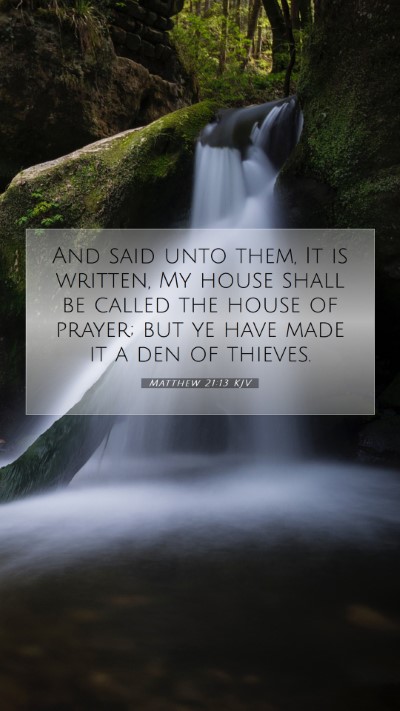Understanding Matthew 21:13
In the Gospel of Matthew, chapter 21, verse 13, we find a pivotal moment during Jesus' ministry. This verse reads: "And said to them, 'It is written, My house shall be called the house of prayer; but ye have made it a den of thieves.'" In this passage, Jesus quotes scripture to illustrate the improper use of the temple.
Bible Verse Meanings
This verse encapsulates Jesus’ righteous anger towards those who exploit religion for personal gain. The temple, intended as a sacred place for prayer and communion with God, had been corrupted into a marketplace. The interpretation of this verse reveals the significant theme of purity in worship and the sanctity of God’s house.
Bible Verse Interpretations
From the perspectives of various public domain commentaries, we gather valuable insights:
- Matthew Henry: Henry emphasizes that Jesus' actions and words were a reminder of the sacredness of the worship space. The phrase "den of thieves" illustrates how commercialism was overshadowing true worship, leading people away from genuine faith.
- Albert Barnes: Barnes provides an analysis emphasizing the ironic reality of the temple's decline from a place of prayer to one of profit. He draws attention to the need for reverence and caution in places dedicated to God.
- Adam Clarke: Clarke expands on the prophetic implications of the verse, explaining how it reflects a broader message about Jesus' mission to cleanse and restore true worship practices.
Understanding Scripture
This verse also touches on the eternal significance of Jesus' teachings on integrity and purity in worship. Every believer is called to reflect on how they engage with their faith and spaces dedicated to God. The lesson is clear: we must avoid turning our spiritual lives into a transactional experience and instead strive for genuine connection with God.
Bible Study Insights
For anyone engaged in bible study groups, understanding Matthew 21:13 provides a profound lesson. By examining the scripture in the context of Jesus' actions, believers can gain deeper insights into the nature of worship and the importance of maintaining its sanctity.
Application of Bible Verses to Daily Life
This passage challenges us to assess our own lives. Are there areas where we allow materialism or superficiality to intrude into our relationship with God? As we analyze this scripture, we should strive for authenticity and devotion in our worship practices.
Bible Verse Commentary
Here are some key observations drawn from the commentaries:
- The significance of Jesus’ authority in cleansing the temple.
- The contrasting roles of the temple as a place of prayer versus a commercial enterprise.
- The prophetic fulfillment of Old Testament scriptures regarding worship and reverence.
Related Cross References
Matthew 21:13 resonates with several other Bible passages that further illustrate the themes present in this verse:
- Isaiah 56:7: "For my house shall be called a house of prayer for all nations."
- Jeremiah 7:11: "Is this house, which is called by my name, become a den of robbers in your eyes?"
- Luke 19:46: "It is written, 'My house is the house of prayer, but you have made it a den of thieves.'" - A parallel account illustrating the same point.
Biblical Exegesis
In summary, Matthew 21:13 serves as a critical reflection on how the sacredness of worship should not be compromised by worldly pursuits. In the context of our modern lives, this verse encourages believers to engage in online bible study and utilize bible study tools to deepen their understanding of scripture, ensuring that their relationship with God remains genuine and unhindered by distractions.
Final Thoughts
Interpretation of Bible verses like Matthew 21:13 requires diligent study and meditation. Through careful analysis and the application of commentary insights, believers can gain clarity and understanding of what Jesus sought to convey about authentic worship. This passage not only instructs on the practices within temple walls but also calls for personal introspection regarding how we honor God in our everyday lives.


